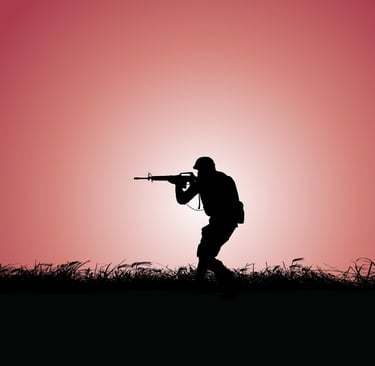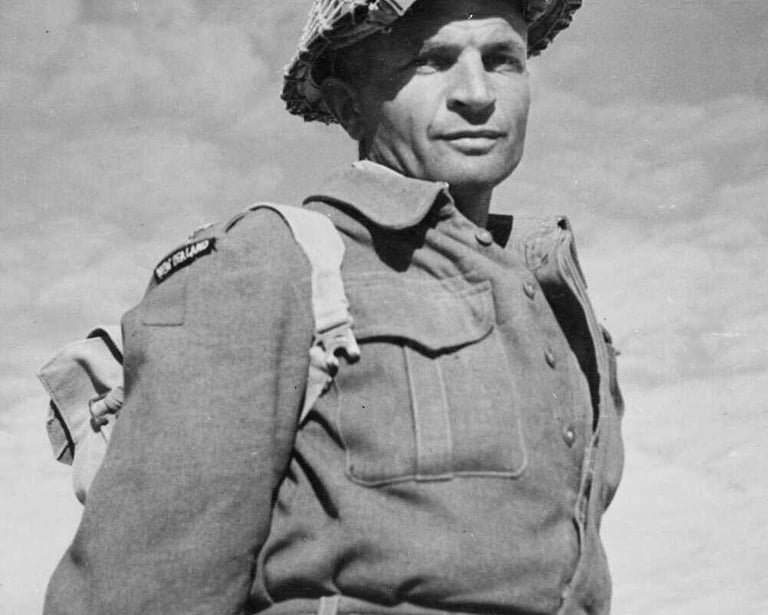Storysmith | • True Stories AND Creative Inspiration | Follow Me


Victoria Cross Stories
Tales of unbelievable Heroism
Charles Upham VC and Bar: The Reluctant Hero Who Defied the Impossible
Humble Beginnings
Charles Hazlitt Upham was born in Christchurch, New Zealand, in 1908. The son of a lawyer, hegrew up on a farm and was known for his strong sense of fairness and quiet determination. As ayoung man, he studied agriculture and worked as a farm manager, later becoming a governmentvaluer.
When war broke out in 1939, Upham didn't rush to sign up for glory. He joined the New ZealandArmy as a private, believing in service, not recognition. His rise through the ranks was purely basedon ability - and courage.
What no one could predict was that this mild-mannered Kiwi would become a living legend on two continents.
First Victoria Cross: Crete, 1941
In May 1941, Upham was a second lieutenant in the 20th Battalion, 2nd New Zealand Division,stationed on the Greek island of Crete, just before the German airborne invasion began.
The fighting was intense. Upham's unit faced waves of elite German paratroopers and mountaintroops. For nine days, Upham led from the front - not by shouting orders, but by charging enemypositions, risking death again and again to protect his men.
His first VC was awarded for actions during a brutal stretch between 22 and 30 May 1941, which included: - Charging machine-gun nests alone, using grenades to kill or drive off the enemy- Dragging wounded soldiers to safety under direct fire- Climbing steep ridges under mortar fire to deliver orders and ammunition- Holding off a German attack with rifle fire and grenades after most of his platoon was wiped out- Being wounded in the shoulder and foot, and still refusing evacuation
Upham never mentioned his injuries. He stayed with his men until the very last day, when the Allieswithdrew from Crete under German air superiority.He was recommended for the Victoria Cross - the British Empire's highest award for bravery - and itwas approved in October 1941.
But Charles Upham's war wasn't over. Not even close.Second Victoria Cross: Ruweisat Ridge, Egypt, 1942
One year later, Upham, now a captain, was fighting in the North African desert with the Eighth Army during the First Battle of El Alamein. In July 1942, during the fighting around Ruweisat Ridge, Upham's company was ordered to attack entrenched German positions. The odds were poor. The desert offered no cover. The Germans were dug in, well-supplied, and armed with machine guns, mortars, and tanks.
But Upham led the charge. Again. Despite suffering from dysentery and running a high fever, he performed acts of heroism so extreme they bordered on suicidal: - He single-handedly destroyed a German truck full of soldiers with grenades - He was blown off his feet by a mortar but crawled back and kept fighting - When his platoon was pinned down, he walked upright across open ground under fire to assess the position and guide his men forward- He charged a machine-gun nest alone and killed the crew with a pistol and grenades- Later, when most of his company had been killed or wounded, he personally covered their withdrawal, sniping at German positions with deadly precision.
He was eventually shot through the elbow and captured after collapsing from blood loss and exhaustion. German medics wanted to amputatate his arm - but Upham insisted it be saved. He survived.
While recovering in a POW camp, German officers, impressed by his resilience, offered him parole - if he would promise not to escape. He refused. He attempted to escape multiple times, including jumping from a moving train and cutting through barbed wire with stolen tools.
Finally, the Germans gave up and sent him to Colditz Castle, the high-security prison for incorrigible escapees.
A Reluctant Legend
Back home in New Zealand, Charles Upham's legend was growing. In 1945, it was announced that he would receive a Bar to his Victoria Cross - the equivalent of being awarded the VC a second time.
He was the first to receive a Bar for combat actions - and remains the only soldier in history to have done so as a frontline infantryman. When King George VI pinned the medals to his chest, he reportedly said: "I did not believe such a man existed."
But Upham remained humble - even uncomfortable - about the attention. He refused offers of knighthood and declined to talk about his medals. In fact, he once said: "The only thing I'm really proud of is that I managed to keep my men together when everything was against us."
Life After the War
After the war, Upham returned to New Zealand and lived on a sheep farm. He married his wartime sweetheart, Molly, and raised three daughters. He rarely spoke about his experiences, and kept his medals in a drawer, out of sight.
He was admired for his honesty, humility, and sense of duty. In his later years, he became a quietadvocate for veterans and continued to shun publicity.
He passed away in 1994, at the age of 86.
Today, he is buried in Christchurch, his grave visited by soldiers and civilians alike - people who come to pay tribute to a man whose courage speaks louder than any words ever could.
Why He Still Matters
Charles Upham wasn't fearless. He was something much rarer: brave despite fear, selfless despite pain, and loyal despite the odds. He fought not for glory, but for his comrades. He never claimed to be special - but history, and the men who served under him, knew better. He was the kind of man war creates only once in a lifetime - and the kind of man peace should never forget.



